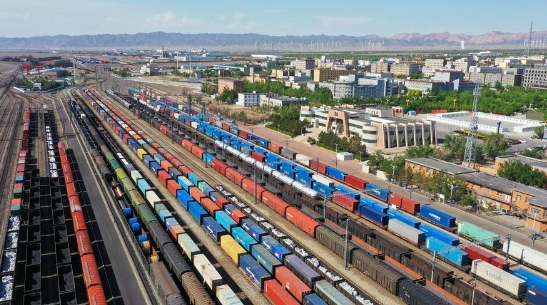Xinjiang launches freight train route to Central Asia

A drone photo taken on May 25, 2024 shows freight trains waiting for departure at the Alataw Pass in northwest China's Xinjiang Uygur Autonomous Region. (Photo by Yu Hui/Xinhua)
A train carrying 45 containers of automobile parts on Wednesday departed from the city of Wusu in northwest China's Xinjiang Uygur Autonomous Region, marking the launch of an international freight train route linking Xinjiang with the city of Almaty in Kazakhstan.
The Wusu freight train station was designated as an official departure point for the China-Europe Railway Express in September, a move aimed at improving the efficiency of logistics and promoting trade between Xinjiang and Central Asia.
Four freight trains will depart from the station this month, and they will pass through either Alataw Port or Horgos Port -- two land ports in Xinjiang located on the border between China and Kazakhstan -- to deliver goods to the Central Asian and European markets.
The new route will support the export of agricultural products, industrial products and other local goods, while also facilitating market entry into Xinjiang and other Chinese markets, which will enrich consumer choice.
"The operations of the new freight route and the opening of the Wusu railway station will reduce logistics costs, transportation distance and time for enterprises," said Zhong Guannan, a sales manager at a tomato processing company with an annual export volume of 30,000 tonnes. The company's logistics costs will be reduced by 20 yuan (about 2.82 U.S. dollars) to 25 yuan per tonne, Zhong noted.
According to China Railway Urumqi Group Co., Ltd., 13,500 China-Europe freight trains passed through the railway ports of Alataw or Horgos in the first 10 months of 2024, a year-on-year increase of 13.4 percent, with a total cargo volume of 23.76 million tonnes, a yearly increase of 12.3 percent.
The China (Xinjiang) Pilot Free Trade Zone was established in November 2023 and became the first free trade zone in China's northwestern border regions. As it celebrates its first anniversary, the zone has reported promising results.
From January to August, Xinjiang's import and export volume increased 30.9 percent to 285.32 billion yuan.
Editor:伏娅敏
